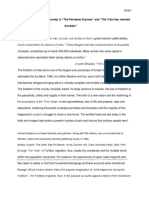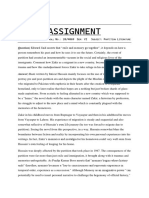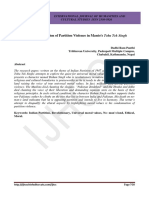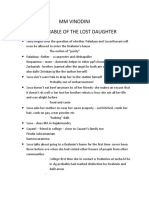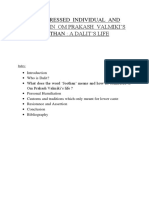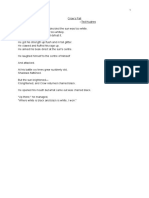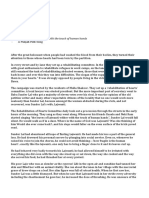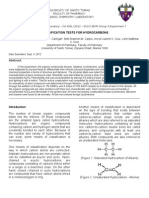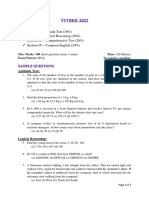0% found this document useful (0 votes)
668 views7 pagesDalit Rights: A Rising Sun
The poem explores differences between immigrant and English culture through the interaction between a Caribbean immigrant speaker and Mr. Oxford don, an imaginary English professor who represents those in the UK who discriminate against immigrants. While the outer composition includes 8 stanzas of varying lengths, the inner composition examines aspects of this discrimination, such as criticisms of immigrants' language usage. The speaker purposefully uses non-standard grammar to reclaim this aspect of his culture and push back against such discrimination.
The short story is about a goodbye party being held for Miss Pushpa as she is leaving for a foreign country to improve her career prospects. The narrator, who is hosting the party, addresses the colleagues and subordinates in attendance, praising Miss Pushpa
Uploaded by
203 Richa ChavanCopyright
© © All Rights Reserved
We take content rights seriously. If you suspect this is your content, claim it here.
Available Formats
Download as DOCX, PDF, TXT or read online on Scribd
0% found this document useful (0 votes)
668 views7 pagesDalit Rights: A Rising Sun
The poem explores differences between immigrant and English culture through the interaction between a Caribbean immigrant speaker and Mr. Oxford don, an imaginary English professor who represents those in the UK who discriminate against immigrants. While the outer composition includes 8 stanzas of varying lengths, the inner composition examines aspects of this discrimination, such as criticisms of immigrants' language usage. The speaker purposefully uses non-standard grammar to reclaim this aspect of his culture and push back against such discrimination.
The short story is about a goodbye party being held for Miss Pushpa as she is leaving for a foreign country to improve her career prospects. The narrator, who is hosting the party, addresses the colleagues and subordinates in attendance, praising Miss Pushpa
Uploaded by
203 Richa ChavanCopyright
© © All Rights Reserved
We take content rights seriously. If you suspect this is your content, claim it here.
Available Formats
Download as DOCX, PDF, TXT or read online on Scribd
/ 7













